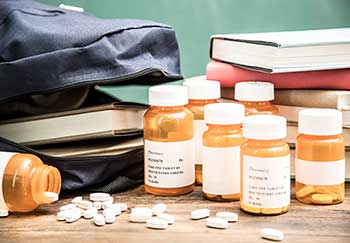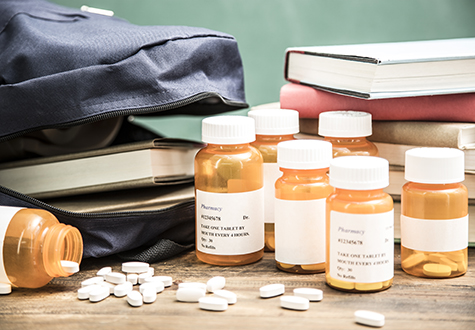
What is a study drug? It’s the fastest‐growing drug problem in the United States, outpacing the rise of cocaine, heroin and methamphetamines. Teens struggling in school look to study drugs — prescription stimulants prescribed for ADHD — to boost their grades.
A 2016 Monitoring the Future (MTF) study found that 6.2 percent of high school seniors and 4.2 percent of high school sophomores report having taken someone else’s prescription Ritalin at least once.
Why ADHD Medication?
With ADHD, chemicals called neurotransmitters, which are responsible for smoothly and efficiently transmitting signals between brain cells, have less activity in certain parts of the brain. This produces problems like:
- Hyperactivity
- Difficulty focusing and concentrating
- Lack of self‐control
Ironically, stimulants that correct the brain chemical imbalance can help people with ADHD find calm and focus. Teens abuse ADHD medicines hoping for the same effects: They think stimulants will help them stay awake longer and concentrate better on their studies.
The facts: Abusing stimulants in this way has not been shown to result in better exam scores or grades.
Access to Study Drugs
Teens obtain these study drugs a number of ways:
- When other students give away or sell their own prescribed ADHD medications to classmates
- By falsely claiming to have ADHD symptoms
- Through stealing
Common prescription stimulants diagnosed for this purpose include Adderall, Concerta, Ritalin and Vyvanse.
Study Drug Dangers
Teens may believe wrongly that these drugs are perfectly safe because they were prescribed by a healthcare professional and purchased at a pharmacy.
“Taking ADHD medication when you do not have that condition increases the likelihood that you will experience adverse effects such as irregular heartbeat, increased blood pressure, anxiety, paranoia, dizziness, headache, mouth dryness and inability to sleep,” says Christopher Holstege, MD, medical director of the Blue Ridge Poison Center. “It could also react poorly with other medicines you might already be taking or with certain pre-existing medical conditions or allergies.”
People with ADHD do not develop a tolerance to the drug’s therapeutic benefits. But abusers often develop a tolerance to the stimulant’s effects and find they need higher and higher doses to achieve the same results.
They may experience cravings and suffer from withdrawal symptoms, including exhaustion, depression and panic.
Do You Know Someone Using Study Drugs?
Do you have a child or know someone abusing stimulants?
A doctor or a counselor can help with issues of stress, sleep and concentration. Talk with your primary care provider about local resources.
How to Prevent Teen Prescription Drug Abuse
- Talk to your teen. Communicate the dangers — physical and legal — of giving away, selling, stealing or using someone else’s prescription medicine.
- Keep track of medicines in your home. Know how many pills are in each prescription and what they look like. You should be able to notice if any are missing or have been replaced.
- Protect your prescriptions as if they were money or other valuables. The medicine cabinet is the first place someone hoping to find medicine will look. Find another location, preferably a locked box. Keep it a secure location known only to you.
- Check your medicine supply for outdated products or leftover products that you no longer need, and discard them. The only way to guarantee that a pill will never be abused is to get rid of it completely.
- Store medicines out of the sight and reach of young children. ADHD medications can be dangerous to a small child.
This article appeared in its original form in The Antidote (PDF), a newsletter produced by the Blue Ridge Poison Center.
